 Petzlover
Petzlover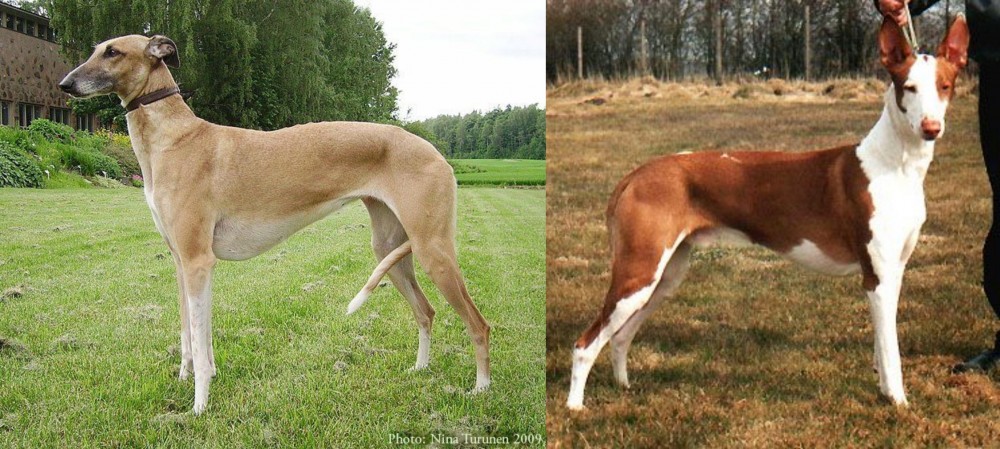 Hortaya Borzaya is originated from Russia but Podenco Canario is originated from Spain. Hortaya Borzaya may grow 11 cm / 5 inches higher than Podenco Canario. Hortaya Borzaya may weigh 10 kg / 23 pounds more than Podenco Canario. Both Hortaya Borzaya and Podenco Canario has almost same life span. Both Hortaya Borzaya and Podenco Canario has same litter size. Both Hortaya Borzaya and Podenco Canario requires Low Maintenance.
Hortaya Borzaya is originated from Russia but Podenco Canario is originated from Spain. Hortaya Borzaya may grow 11 cm / 5 inches higher than Podenco Canario. Hortaya Borzaya may weigh 10 kg / 23 pounds more than Podenco Canario. Both Hortaya Borzaya and Podenco Canario has almost same life span. Both Hortaya Borzaya and Podenco Canario has same litter size. Both Hortaya Borzaya and Podenco Canario requires Low Maintenance.
 The Hortaya Borzaya is an ancient sighthound from Asia with its origins in Kievan Rus = Grand Duchy of Lithuania = Polish-Lithuanian Commonwealth and the Empire of Russia. The Hortaya is a large dog, especially a long in body dog with a muscular build suitable for running fast. He is one of the most talented of sighthounds, able to track moving prey at quite great distances. He is an intensely active when running prey and quiet and well balanced when not working.
The Hortaya Borzaya is an ancient sighthound from Asia with its origins in Kievan Rus = Grand Duchy of Lithuania = Polish-Lithuanian Commonwealth and the Empire of Russia. The Hortaya is a large dog, especially a long in body dog with a muscular build suitable for running fast. He is one of the most talented of sighthounds, able to track moving prey at quite great distances. He is an intensely active when running prey and quiet and well balanced when not working.
In Asia and Russia, it is still a working hunting dog, hunting a variety of game such as Saiga antelopes, wolves, foxes, and hares. With tremendous endurance, the Hortaya can run at great speeds and great distances on the hunt. The Hortaya Borzaya is a long distance runner rather than a sprinter like the greyhound we are all so familiar with. He also needs very little rest between runs of up to 4 km. The Hortaya uses his sense of smell as well as sight in the hunt. They hunt solo, in pairs or in packs.
It was not until 2004 that the Hortaya was first exported to Europe and given full breeding papers. They went to Germany, Slovakia and the Czech Republic in 2004. They went to Switzerland and Finland in 2005 and to the United States around 2005. Prior to this the Hortaya Borzaya was bred only in its original territory for thousands of years.
Unlike Western breeding programs, the Hortaya is not bred for the purpose of improving the breed. Like Asian thoroughbred horses the breed is considered “finished”. Because of this there was no inbreeding, linebreeding or incest. This is true for about 4-6 generations of a line. This helps the breed to stay healthy.
The breed was developed centuries ago being bred by many different groups of people throughout the region, making it impossible to say exactly where and how this Central Asian/Afghanistan/ southern Russian breed developed. The Russian Kynological Federation (RKF) member of the FCI, developed a standard for the Hortaya Borzaya, which unlike most breed standards, does not tell you what the Hortaya must be like. Instead it tells you what he cannot be.
It gives boundaries that the dog must fit inside in order to be considered a Hortaya Borzaya. This is because the breeds of these dogs in their native territories want to preserve as many different types and sub-types as possible under the banner of one breed. To most people these dogs would look like very different breeds. For this reason, they have not been accepted into International Breed Groups and Associations. The breeders of these dogs do not want to be tied down to one standard. They do not want the breed to be separated into western lines and the original line or show lines and working lines. They wish to keep all the dogs within one grouping.
The breed is recognized on the national level by the originating countries and federations, including Russia’s. There are an estimated 2500-3500 dog of this breed in existence to day. Only a few dozen of the breed exist outside of the original countries. In other Eastern and European countries, the dogs may be registered with hunting associations instead of a breed association.
The breed is held mostly by hunters in remote, local areas and villages that are fairly isolated. Here the Hortaya is seen as a partner in feeding the hunters family and the dog is invaluable. In these remote areas a good hunting dog is equal in value to the good horse. Both are essential to the hunter and his family’s livelihood.
The Hortaya Borzaya is a pack dog and does well with the family as well as an athletic hunter. They hunt in packs, small groups or alone and bring their catch back to the hunter for the family meal. No hunter had to go with the dog. In fact, the hunters would send the dogs several times for food. The Hortaya might travel for miles across tough terrain to get food for the family.
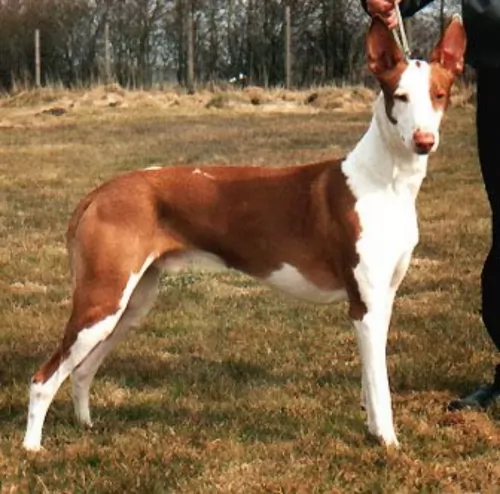 The Podenco Canario comes from the Canary Islands (Spain) and is still used for hunting purposes to this day, although it is also becoming more of a companion dog.
The Podenco Canario comes from the Canary Islands (Spain) and is still used for hunting purposes to this day, although it is also becoming more of a companion dog.
It is believed that the dog descended from ancient dogs which were brought to the islands from Egypt and North Africa by early human settlers.
 This athletic sighthound is a handsome dog, ranging from large to giant. Remember there are many different ‘types’ of dogs within the one line/breed of Hortaya. Breed standards are exclusionary, and performance based rather than inclusionary, and appearance based. Still most of the breed lines share many of the same traits.
This athletic sighthound is a handsome dog, ranging from large to giant. Remember there are many different ‘types’ of dogs within the one line/breed of Hortaya. Breed standards are exclusionary, and performance based rather than inclusionary, and appearance based. Still most of the breed lines share many of the same traits.
They are a long legged breed with a very deep chest and flexible spine. They have immensely strong lungs and a narrow but long skull. Their gait is fluid, effortless trotting when not hunting. When she is hunting, they gallop like a horse and cover a lot of ground.
There eyes are usually black but can be any color and their fur is also any color. It is thick and dense. Finally, in the 2000’s, there were some dogs in a subline exported to Europe and to North America. Here, for this subgroup, a standard was established based on appearance and the color or the coat was now set at only white, blue, black, cream, red, sable and brindle, and piebald. They might or might not have a saddle. Definition of this type is still going on and has not been entirely settled yet. This standard is only for the European and American market show dogs.
These dogs, bred for show, have the same ability to run like the wind and for a very long time with his muscled body and long legs. The breed has strength and stamina that will fool you. He also has a long neck and broad back. He has thin, short ears.
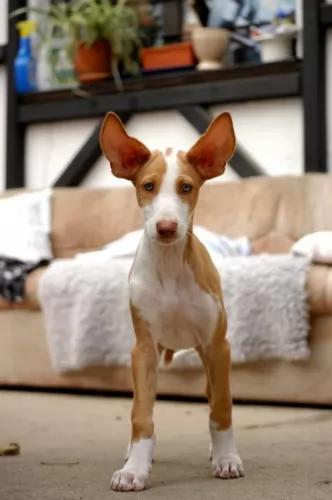 The Podenco Canario is a medium sized dog and stands at between 55 and 64cm and weighs between 20 and 25kg. This is a slender, muscular dog but still robust and sturdy. There are in fact 2 sizes of Podenco Canarios – one is the medium sized dog of up to 64cm and the other is a smaller size.
The Podenco Canario is a medium sized dog and stands at between 55 and 64cm and weighs between 20 and 25kg. This is a slender, muscular dog but still robust and sturdy. There are in fact 2 sizes of Podenco Canarios – one is the medium sized dog of up to 64cm and the other is a smaller size.
The coat of the dog is short and smooth and is a rich red color or even chocolate brown. There are dogs which can have some white markings. The dog's nose and skin should be a shade of red and these dogs are known to blush when they become animated. The neck of the dog is long with the head being long and slender too, with the large bat-like ears being erect.
This dog can become very attached to his human family and is somewhat reserved around strangers. He is smart and will be able to learn easily. Training and socialization will be necessary to him as it makes him balanced and obedient.
He will appreciate a firm, consistent, kind owner as he is a dog that is strong willed and stubborn. He is a gentle dog too and can play well with children who have been taught to treat dogs with respect. He is active and will require a good deal of daily exercise.
 Children friendliness - yes, they are very good with children and will play with them for hours.
Children friendliness - yes, they are very good with children and will play with them for hours.
They have tremendous stamina, speed and intelligence to hunt on their own without the hunter and bring the prey back in good shape for the hunter’s family to eat.
No they are not very adaptable in terms of living arrangements. They will not do well in an apartment and probably not in the city as they need land to run.
Learning ability yes, they are intelligent and learn easily.
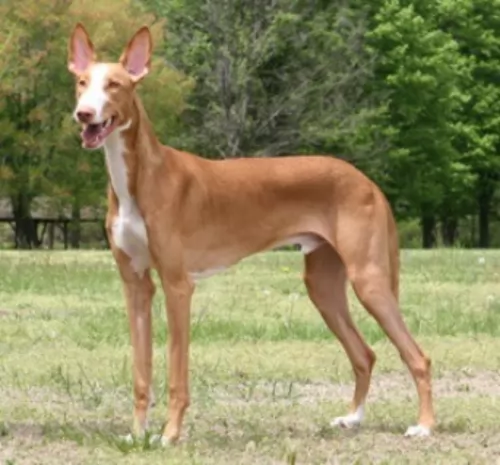 The Podenco Canario is a quiet breed that isn’t going to cause you trouble as he just slots into your way of life.
The Podenco Canario is a quiet breed that isn’t going to cause you trouble as he just slots into your way of life.
He is easy going, gentle and smart and wants to please. He is also a low maintenance dog, easy to please if he benefits from a good dose of exercise and human interaction.
Early socialization and training is important, as with any other dog breed, and then he becomes an excellent pet and friend of the family.
 As previously mentioned, the original breed is isolated and therefore has a pretty good health track record. Most of the breed specific illnesses or conditions that usually are inherited barely exist in this breed.
As previously mentioned, the original breed is isolated and therefore has a pretty good health track record. Most of the breed specific illnesses or conditions that usually are inherited barely exist in this breed.
They have a propensity toward obesity and diet is essential to prevent other issues.
Chronic or acute pancreatitis is possible because the breed developed eating small meals and hardly any meat. Too much meat or fat could cause this.
No tolerance for high protein dog food. Can cause puppies to have life threatening damage to bones and cartilage that is irreversible.
Bloat – because of the deep chest and the intolerance for large meals they are prone to bloat.
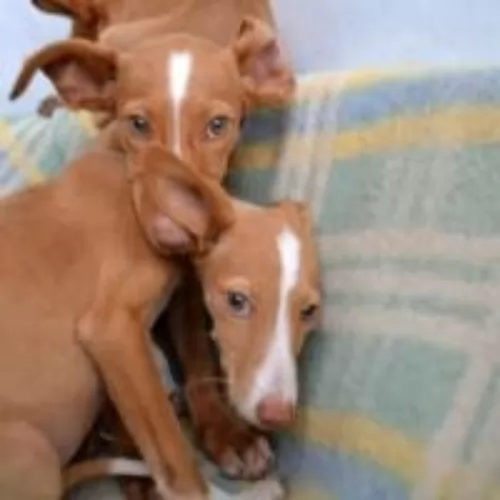 Your Podenco can live to be 10, 11 or 12 years of age if looked after well. Because he is a primitive breed, he is able to throw off some diseases that other dogs might battle with. Just like with other dogs however, he can battle with some health problems. One of two of the common dog illnesses to watch out for include -
Your Podenco can live to be 10, 11 or 12 years of age if looked after well. Because he is a primitive breed, he is able to throw off some diseases that other dogs might battle with. Just like with other dogs however, he can battle with some health problems. One of two of the common dog illnesses to watch out for include -
Skin problems can create havoc for your dog. They can be frustrating, painful and itchy. Skin problems can come from parasites, allergies and skin infections. Common parasites that involve the skin include ticks and fleas and mites. Dogs themselves can also cause irritation of the skin by licking one area over and over again from sheer boredom and stress.
To prevent this life threatening disease, try and feed your dog 2 meals a day instead of one so that he doesn't gobble his food up. This can contribute to bloat. The stomach fills with gas and the stomach can twist and bring death to the dog. Get your dog to the vet immediately if you see he is restless,drooling and has a swollen stomach.
This is particularly worrisome if you live in an area where there are lots of mosquitoes. Heartworm infections can be deadly for your dog. Speak to your vet about preventative treatment if you are traveling to an area known for its mosquito problems..
 As mentioned above do not overfeed a Hortaya Borzaya puppy. There is serious risk of irreversible damage if you do. Feed small meals 3-6 times a day with lower protein.
As mentioned above do not overfeed a Hortaya Borzaya puppy. There is serious risk of irreversible damage if you do. Feed small meals 3-6 times a day with lower protein.
3 cups of an average protein high quality dog food served at least 3-4 times per day. To avoid bloat do not feed large meals before or after exercise and don’t let your dog drink a lot of water at one time.
This is an extremely active dog bred to hunt 5-6 times a day over wide expanses of various and rough terrain. They need exercise. If you run, they will run with you happily and they will outlast you. They are good at and enjoy fetch, chase, agility, and field trials. They will last hours at any game they play.
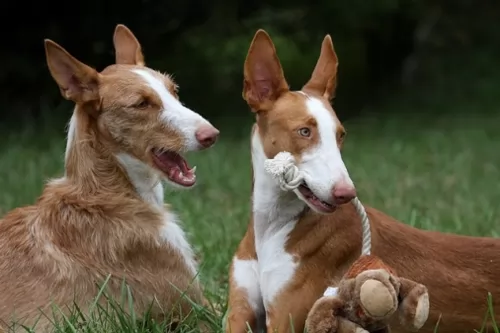 Provide your dog with a daily dose of exercise. He will love to have a walk with you every day but ball games will also be important for him.
Provide your dog with a daily dose of exercise. He will love to have a walk with you every day but ball games will also be important for him.
Your Podenco Canario is a medium-breed dog, with a slim, muscular build To keep him that way, ensure he has a high quality commercially manufactured dog food that is high in the vitamins and minerals he needs.
Dry kibble needs to be enhanced with some home-made food. Boiled chicken, brown rice, sweet potatoes, carrots and spinach are excellent when chopped up and added occasionally to the dry kibble. You can also include some raw meat into his food from time to time. Such nutritious food which is simple, can help your dog live a long, healthy, happy life.
Your dog has a short coat and a brush twice a week will keep it in tip top condition. Make use of these brushing sessions to check your dog’s coat for fleas and ticks. Also check him over for any new lumps. Cancer is an ever present threat with dogs.
Look inside his ears for any signs of redness, and try and look inside his mouth too for signs of bad teeth. His nails should also be kept short and trimmed. If they get too long they can hook onto things and rip the flesh open.